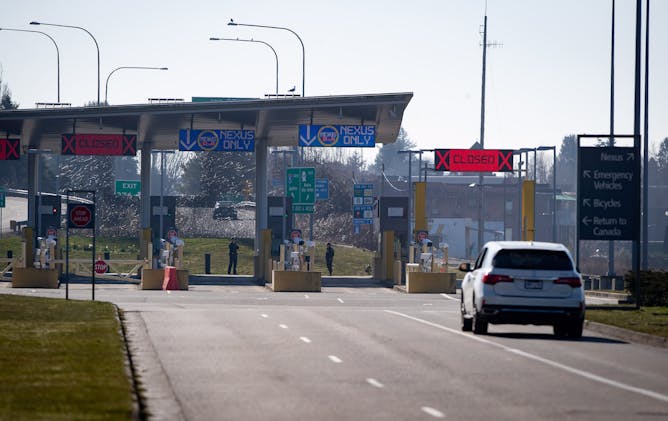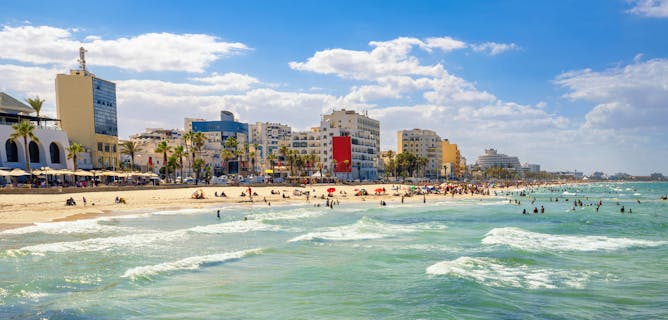|
Canada is one of the last Western nations to close its borders as a response to the coronavirus pandemic. It's a big shift from last week when Health Minister Patty Hajdu said travel restrictions aren't not particularly effective. Her reasoning was backed up by the World Health Organization, which does not recommend border restrictions as a way to combat COVID-19.
Today in The Conversation Canada, Natalie Delia Deckard and Dara Vosoughi of the University of Windsor explain how migration has always been a hot-button issue, but in this crisis, the politics of population and nativism are butting heads with Canada's image as a welcoming nation.
Also today:
Regards,
|

A British Columbia motorist approaches the U.S. port of entry into Blaine, Wash., at a very quiet Douglas-Peace Arch border crossing on the day Ottawa and Washington announced the Canada-U.S. border will be closed to non-essential traffic because of the COVID-19 pandemic.
THE CANADIAN PRESS/Darryl Dyck
Natalie Delia Deckard, University of Windsor; Dara Vosoughi, University of Windsor
Canada's ban on foreign travellers is not consistent with the science of the pandemic or Canada's own values of inclusion and
|

Dystopic science fiction provides a reference points for our anxieties during a time of global change.
(Shutterstock)
Katherine Shwetz, University of Toronto
Pandemic fiction is more popular than ever -- but what these books and movies offer us isn't as straightforward as you might think.
|

Pro-China counter-protesters, wearing red, shout down a man in a black shirt during a rally for Hong Kong in Vancouver in August 2019. The University of British Columbia is taking measures to enhance respectful dialogue over Hong Kong divisions.
THE CANADIAN PRESS/Darryl Dyck
Timothy Cheek, University of British Columbia; Cassandra Jeffery, University of British Columbia
Improving the China-Canada diplomatic relationship is fraught with hurdles, but it's not impossible. At minimum, we must understand the root cause of the problem from multiple vantage points.
|

Despite the 2015 terrorist attack in Sousse, Tunisia, shown in this photo, the north African country remains a relatively safe country for investors compared to some of its neighbours.
(Shutterstock)
Tatiana Vashchiko, University of Calgary; Andreea S. Mihalache-O'Keef, Roanoke College; Anne E. Kleffner, University of Calgary; Ekrem Karakoç, Binghamton University, State University of New York; Martin Halek, University of Calgary
Those who conduct business in Tunisia consider it a low-risk security environment compared to some of its neighbours in North Africa and the Middle East.
|

Elpistostege watsoni, ce poisson à pattes ou ce tétrapode à nageoires est le plus proche de ce que l’on pourrait considérer comme un « chaînon manquant.
Artiste : Katrina Kenny
Richard Cloutier, Université du Québec à Rimouski (UQAR); John Long, Flinders University
Une espèce qui a vécu il y a 380 millions d'années révèle l'origine de nos mains. Il est le plus proche de ce que l’on pourrait considérer comme un « chaînon manquant ».
|
Arts
|
-
WIlliam Niven, Nottingham Trent University
Amazon’s new TV series series divided the critics, but almost everyone agrees that it takes problematic liberties in its representation of Auschwitz.
|
|
Environment + Energy
|
-
Per Berggren, Newcastle University; Andrew Temple, Newcastle University
Scientists thought there was only one sixgill sawshark species – until now.
|
|
Science + Technology
|
-
Doug Specht, University of Westminster; Julio Gimenez, University of Westminster
From coronavirus to climate change, it's easy to be misled by some reporting.
|
|